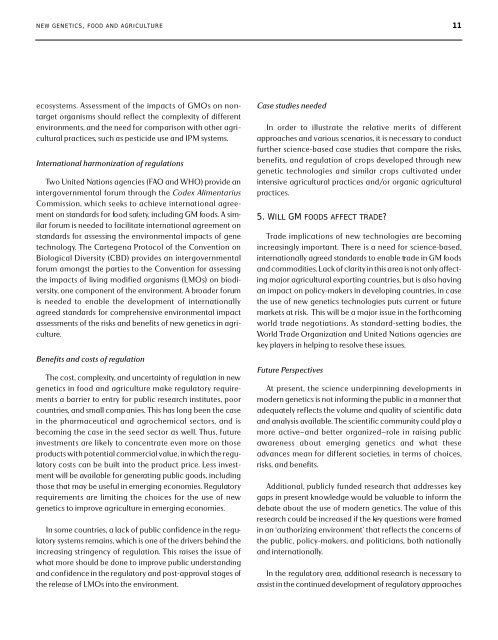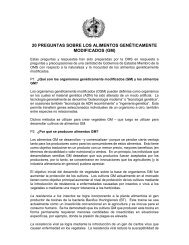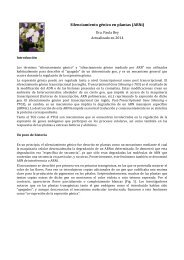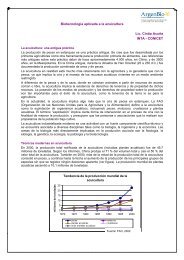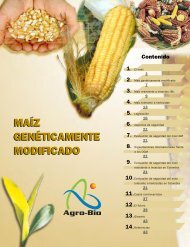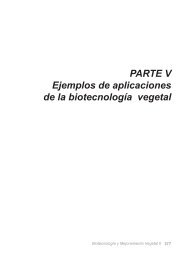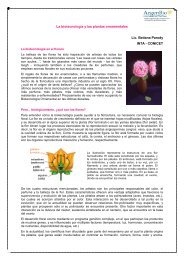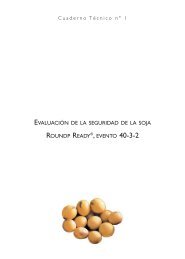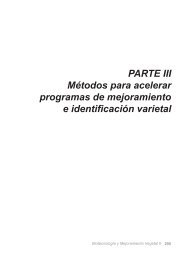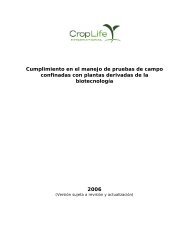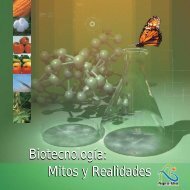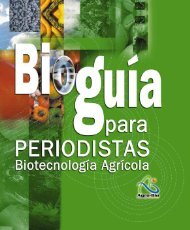New Genetics, Food and Agriculture: Scientific ... - ArgenBio
New Genetics, Food and Agriculture: Scientific ... - ArgenBio
New Genetics, Food and Agriculture: Scientific ... - ArgenBio
Create successful ePaper yourself
Turn your PDF publications into a flip-book with our unique Google optimized e-Paper software.
N E W G E N E T I C S, F O O D A N D A G R I C U LT U R E 11e co sys tems. Assessment of the impacts of GMOs on nontargetorg anisms should re flect the co m pl e x i ty of diffe re n tenvironments, <strong>and</strong> the need for comparison with other agriculturalpractices, such as pesticide use <strong>and</strong> IPM systems.International harmonization of regulationsTwo United Nations agencies (FAO <strong>and</strong> WHO) provide ani n te rg ove r n m e n tal fo r um th rough the Codex Al i m e n tar i usCommission, which seeks to achieve inte r n ational agre e-ment on st<strong>and</strong>ards for food safety, including GM foods. A similarforum is needed to facilitate international agreement ons tan d ards for as s essing the env i ro n m e n tal impacts of genete c h n ol ogy. The Car tegena Pro tocol of the Co nve n tion onB i ol og i cal Dive rs i ty (CBD) prov i d es an inte rg ove r n m e n ta lfo r um amongst the par ti es to the Co nve n tion for as s es s i n gthe impacts of living mod i fied org anisms (LMOs) on biod i-versity, one component of the environment. A broader forumis needed to enable the development of inte r n ati o n a l l ya greed stan d ards for co m p re h e n s ive env i ro n m e n tal impa c tassessments of the risks <strong>and</strong> benefits of new genetics in agriculture.Benefits <strong>and</strong> costs of regulationThe cost, complexity, <strong>and</strong> uncertainty of regulation in newg e n e ti cs in food <strong>and</strong> agr i cu l ture make re g u l ato ry re q ui rementsa barrier to entry for public res e arch insti tutes, poo rcountries, <strong>and</strong> small companies. This has long been the casein the ph ar m a ce uti cal <strong>and</strong> agroc h e m i cal secto rs, <strong>and</strong> isbe coming the case in the seed sector as well. Thus, futurei nves tments are likely to co n ce n trate even more on th o s eproducts with potential commercial value, in which the regulato ry costs can be built into the product price. Less inves t-ment will be available for generating public goods, includingthose that may be useful in emerging economies. Regulatoryre q ui rements are limiting the choices for the use of newgenetics to improve agriculture in emerging economies.In some countries, a lack of public confidence in the regulatorysystems remains, which is one of the drivers behind thei n c re asing str i n g e n cy of re g u l ation. This rai s es the issue ofwhat more should be done to improve public underst<strong>and</strong>ing<strong>and</strong> confidence in the regulatory <strong>and</strong> post-approval stages ofthe release of LMOs into the environment.Case studies neededIn order to illus trate the re l ative merits of diffe re n tapproaches <strong>and</strong> various scenarios, it is necessary to conductfur ther science - based case stu d i es th at co m pare the risks,be n e fi t s, <strong>and</strong> re g u l ation of crops deve l o ped th rough newg e n e tic te c h n ol og i es <strong>and</strong> similar crops cu l tivated un d e ri n te n s ive agr i cu l tural pra c ti ces an d /or org anic agr i cu l tura lpractices.5. WILL GM FOODS AFFECT TRADE?Trade impl i cations of new te c h n ol og i es are be co m i n gi n c re asingly impo r tant. There is a need for science - bas e d,internationally agreed st<strong>and</strong>ards to enable trade in GM foods<strong>and</strong> commodities. Lack of clarity in this area is not only affectingmajor agricultural exporting countries, but is also havingan impact on policy-makers in developing countries, in casethe use of new genetics technologies puts current or futuremarkets at risk. This will be a major issue in the forthcomingworld trade negoti ations. As stan d ard - s e tting bod i es, th eWorld Trade Organization <strong>and</strong> United Nations agencies arekey players in helping to resolve these issues.Future PerspectivesAt pres e n t, the science underpinning developments inmodern genetics is not informing the public in a manner thatadequately reflects the volume <strong>and</strong> quality of scientific data<strong>and</strong> analysis available. The scientific community could play am o re active — <strong>and</strong> be tter org an i ze d — role in raising publ i caware n ess abo ut emerging geneti cs <strong>and</strong> wh at th es ea dvan ces mean for diffe rent soc i e ti es, in terms of choices,risks, <strong>and</strong> benefits.A d d i tional, publicly funded res e arch th at addres s es keygaps in present knowledge would be valuable to inform thed e bate abo ut the use of modern geneti cs. The value of th i sresearch could be increased if the key questions were framedin an ‘authorizing environment’ that reflects the concerns ofthe public, pol i cy - m a ke rs, <strong>and</strong> pol i ti c i an s, bo th nati o n a l l y<strong>and</strong> internationally.In the re g u l ato ry are a, additional res e arch is neces s ary toassist in the co n tinued development of re g u l ato ry approa c h es


